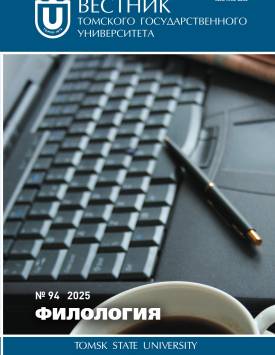A comparative analysis of the concept "colony" in discursive practices of the 18th–19th and 20th–21st centuries
The article studies the changes in the concept "colony" during the 18th-21st centuries revealing its most essential features registered in dictionaries and manifested in discursive practices. The author uses the conceptual analysis procedure, which includes analysis of dictionary definitions, typical contexts and fragments of discourse. The analysis of definitions taken from modern Russian dictionaries enables us to describe the content of the concept "colony" in the following way: a space (territory) which has a size, is a part of a whole, is governed on the basis of subjection. Contexts from the Russian National Corpus show more features of the concept and help to specify its content: a space (territory), which has a size, is a part of a whole, belongs to the subject, is governed on the basis of subjection with violence, has its beginning and its end, changes during this period of time and can be given assessment. The historical analysis shows that the word "colony" had a different meaning in the Russian language. The content of the corresponding concept in the 19th century can be described as follows: a group of people that have changed their place of living having moved to another place and that are different from the people that have lived in this other place before. The contextual analysis of this lexical unit in documents of the first half of the 19th century helped to specify the content of the concept: a group of people that have changed their place of living having moved to another place, that are different from the people that have lived in this other place before and that are governed by the subject who owns this place. This leads to the conclusion that the concept "colony" expanded its meaning in the 20th century owing to the shift of the focus: from "people" to "space". In the 18th century the word "colony" is not often used in documents. Referring to territories belonging to Russia or other countries, the authors of the documents use the word "possession". The analysis of dictionary definitions and the contextual analysis revealed features common with the modern concept "colony": "belonging", "place", "size", "subjection", "assessment". Another word which is used in documents of the 18th century and which denotes Russian territories is "settlement". It shares some common features with the word "colony" in its 19th century meaning: "people", "place", "live", "belonging", "subjection". The semantic and cognitive study of the concept "colony" in the historical perspective and in comparison with related concepts "possession" and "settlement" in documents of the 18th - the first half of the 19th centuries shows the process of its restructuring in the Russian linguistic picture of the world. The author declares no conflicts of interests.
Keywords
colony, word, concept, conceptual analysis, linguistic picture of world, discourseAuthors
| Name | Organization | |
| Sheina Irina M. | Ryazan State University | i.sheina@rsu-rzn.ru |
References

A comparative analysis of the concept "colony" in discursive practices of the 18th–19th and 20th–21st centuries | Vestnik Tomskogo gosudarstvennogo universiteta. Filologiya – Tomsk State University Journal of Philology. 2025. № 94. DOI: 10.17223/19986645/94/6
